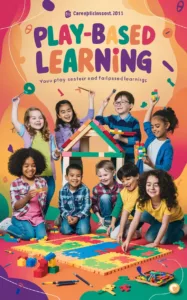As parents, we constantly seek the best for our children, especially regarding their education. One method gaining popularity and recognition is play-based learning. This approach not only makes learning enjoyable but also fosters a range of developmental benefits. Let’s delve into why it is crucial and how it can significantly impact your child’s growth.
What is Play-Based Learning?
Play-based learning is an educational approach that uses play as the primary method for teaching. This method involves activities that are fun and engaging, allowing children to explore, experiment, and discover. Unlike traditional learning, which can be rigid and structured, play-based learning is flexible and child-centered, making it more effective and enjoyable for young learners.
Benefits of Play-Based Learning
- Cognitive Development:
- Play encourages critical thinking and problem-solving skills. When children engage in play, they learn to navigate challenges, make decisions, and find solutions independently.
- Activities like building blocks or puzzles enhance spatial awareness and cognitive abilities.
- Social Skills:
- Through play, children learn to interact, share, and collaborate with peers. This social interaction is vital for developing communication skills and building friendships.
- Role-playing games help children understand different perspectives and develop empathy.
- Emotional Growth:
- Play provides a safe environment for children to express their emotions and learn to manage them.
- It helps in building self-esteem and confidence as children accomplish tasks and receive positive reinforcement.
- Physical Development:
- Physical play activities, such as running, jumping, or climbing, improve gross motor skills.
- Fine motor skills are honed through activities like drawing, cutting, and manipulating small objects.
- Language Development:
- During play, children are exposed to new vocabulary and language structures, which enhances their communication skills.
- Storytelling and imaginative play encourage creative use of language and narrative skills.
How to Incorporate Play-Based Learning at Home
- Create a Play-Friendly Environment:
- Ensure there is a safe and stimulating space for your child to play. Provide a variety of toys and materials that encourage creativity and exploration.
- Rotate toys and activities to keep the environment engaging and prevent boredom.
- Encourage Different Types of Play:
- Free Play: Allow your child to choose their activities and play independently. This fosters creativity and independence.
- Guided Play: Participate in your child’s play to introduce new concepts and skills. This could be as simple as playing a board game together or guiding them in a craft activity.
- Outdoor Play: Encourage outdoor activities that involve physical movement and exploration of nature.
- Be a Play Partner:
- Engage with your child during playtime. Show interest in their activities, ask questions, and provide encouragement.
- Balance guidance with freedom. Allow your child to take the lead while you support and extend their learning.
- Incorporate Learning into Play:
- Integrate educational concepts into play activities. For example, use counting games, alphabet puzzles, or science experiments as playful learning opportunities.
- Use everyday situations as learning moments. Cooking together can teach measurements, while a trip to the park can involve learning about plants and animals.
Addressing Common Concerns
- Is Play-Based Learning Effective?
- Research shows that play-based learning enhances academic and developmental outcomes. Children who engage in play-based learning often perform better in school and exhibit higher levels of creativity and critical thinking.
- Does Play Mean No Structure?
- While play-based learning is flexible, it does not mean a lack of structure. Educators design play activities with specific learning objectives in mind, ensuring that play is purposeful and educational.
- Can Play-Based Learning Be Implemented at Any Age?
- Play-based learning is most effective in early childhood but can be adapted for older children as well. The key is to make learning enjoyable and engaging, regardless of the child’s age.
Conclusion
Play-based learning is a powerful educational approach that nurtures a child’s cognitive, social, emotional, and physical development. By incorporating play into your child’s daily routine, you can foster a love for learning and support their overall growth. Remember, the most important aspect is to make learning fun and meaningful. So, let’s embrace play and watch our children thrive!
By incorporating these elements into your child’s learning journey, you’re not just teaching them academic skills but also essential life skills. It is a gift that keeps on giving, ensuring your child grows up to be a well-rounded and happy individual. For more insights on child development and educational tips, stay tuned to the Golden Bee Global School blog and join our community of proactive parents. Let’s make learning a joyful adventure together! Happy playing!







